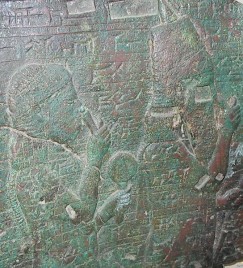ABC 14 (Esarhaddon Chronicle)
The Chronicle Concerning the Reign of Esarhaddon (ABC 14) is one of the historiographical texts about ancient Assyria. It deals with the wars of king Esarhaddon (680-669) and the accessions of his sons Aššurbanipal in Assyria and Šamaš-šuma-ukin in Babylonia.

For a very brief introduction to the literary genre of chronicles, go here. The translation on this webpage was adapted from A.K. Grayson, Assyrian and Babylonian Chronicles (1975) and Jean-Jacques Glassner, Mesopotamian Chronicles (Atlanta, 2004).
This chronicle is preserved on a tablet, BM 25091 (98-2-16, 145), which is 50 mm wide and 76 mm long. At one time the tablet was broken into two fragments. There are several lacunae in the table and the top portion is entirely missing, but can be restored from parallel texts.
Translation
[1] [The first year of the reign of Esarhaddon,note Nabû-zer-kitti-lišir,
[2] governor of the Sealand, having come upstream, set up camp before Ur but did not take the city.
[3] He fled before the officers of Assyria and reached Elam.
[4] In Elam] the king of Elam [captured and executed him.
[5] Es]arhaddon named his brother Na'id-Marduk governor of the Sealand.
[6] In the month Ulûlu the Great and the gods of Der entered Der;
[7] Humhumya and Šimalya entered Sippar.
[8] In the month Tašrîtu the forecourt [...] in the mont[h...]
[9] The second year:note the major-domo conscripted troops in Akkad.
[10] In that same year Arza was captured and sacked.
[11] The people were ransomed, the king and his son were taken prisoner.
[12] There was a slaughter in Buššua and there was a slaughter of the Cimmerians in Šubuhnu.note
[13] The third year:note [...]-ahhe-šullum, governor of Nippur, and Šamaš-ibni, the Dakkurean
[14] were transported to Assyria and executed in Assyria.
[15] The fourth year:note Sidon was captured and sacked. In that same year the major-domo conscripted troops in Akkad.
[16] The fifth year:note On the second day of the month Tašrîtu, the army of Assyria captured Bazza.
[17] In the month Tašrîtu the head of the king of Sidon was cut off and conveyed to Assyria.
[18] The sixth year:note The army of Assyria marched to Milidu and encamped against Mugallu.
[19] On the fifth day of the month Ulûlu, Humban-haltaš, king of Elam, without becoming ill and still appearing healthy, died in his palace.
[20] For six years, Humban-haltaš, ruled Elam.
[21] Urtak, his brother, ascended the throne in Elam.
[22] Šuma-iddina, the governor of Nippur, and Kudurru, the Dakkurean, were executed.
[23] The seventh year:note On the eighth day of the month Addaru the army of Assyria marched to Šamele.
[24] In that same year Ištar of Agade and the gods of Agade left Elam and
[25] entered Agade on the tenth day of the month Addaru.
[26] The eighth year:note On the sixth day of the month Addaru the king's wife died.
[27] On the eighteenth day of the month Addaru the army of Assyria captured Šubria and
[28] sacked it. The tenth year:note In the month Nisannu the army of Assyria marched to Egypt.
[29] On the third day of the month Tašrîtu there was a massacre in Egypt.
[30] The eleventh year:note In Assyria the king put numerous officers to the sword.
[31] The twelfth year:note The king of Assyria marched to Egypt
[32] but became ill on the way and died on the tenth day of the month Arahsamna.
[33] For twelve years Esarhaddon ruled Assyria.
[34] For eight years under Sennacherib, for twelve years under Esarhaddon,
[35] twenty years altogether, Bêl stayed in Aššur and the Akitu festival did not take place.
[36] Nabû did not come from Borsippa for the procession of Bêl.
[37] In the month Kislîmu Aššurbanipal, Esarhaddon's son, ascended the throne in Assyria.
[38] The accession year of Šamaš-šuma-ukin:note In the month Ajaru Bêl and the gods of Akkad
[39] went out from Aššur and on the twenty-fifthnote day of the month Ajaru, they entered Babylon.
[40] Nabû and the gods of Borsippa went to Babylon.
[41] In that same year Kirbitum was taken and its king was captured.
[42] On the twentieth day of the month Tebêtu, Bêl-etir, the judge of Babylon was taken prisoner and executed.
[43] The first year of Šamaš-šuma-ukin:note [...]
[44] to [...]
[45] Taharqo, king of E[gypt, ...]
[46] Eg[ypt...]
[47] Necho, king of Eg[ypt...]
[48] The second year:note [...]
[Lacuna]
[Left edge] Combat. Combat.note